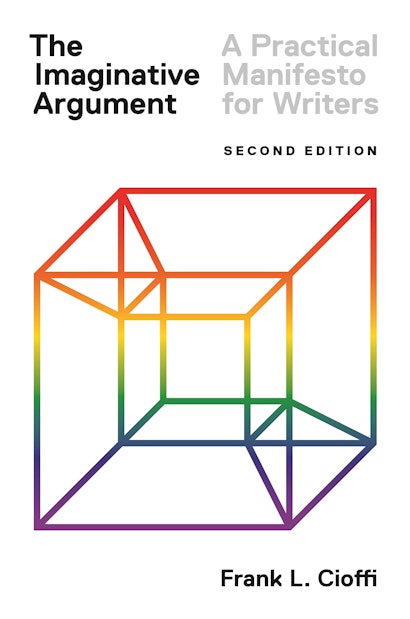More than merely a writing text, The Imaginative Argument offers writers instruction on how to use their imaginations to improve their prose. Cioffi shows writers how they can enliven argument—the organizing rubric of all persuasive writing—by drawing on emotion, soul, and creativity, the wellsprings of imagination. While Cioffi suggests that argument should become a natural habit of mind for writers, he goes still further, inspiring writers to adopt as their gold standard the imaginative argument: the surprising yet strikingly apt insight that organizes disparate noises into music, that makes out of chaos, chaos theory.
Rather than offering a model of writing based on established formulas or templates, Cioffi urges writers to envision argument as an active parsing of experience that imaginatively reinvents the world. Cioffi’s manifesto asserts that successful argument also requires writers to explore their own deep-seated feelings, to exploit the fuzzy but often profoundly insightful logic of the imagination.
But expression is not all that matters: Cioffi’s work anchors itself in the actual. Drawing on Louis Kahn’s notion that a good architect never has all the answers to a building’s problems before its physical construction, Cioffi maintains that in argument, too, answers must be forged along the way, as the writer inventively deals with emergent problems and unforeseen complexities. Indeed, discovery, imagination, and invention suffuse all stages of the process.
The Imaginative Argument offers all the intellectual kindling that writers need to ignite this creativity, from insights on developing ideas to avoiding bland assertions or logical leaps. It cites exemplary nonfiction prose stylists, including William James, Ruth Benedict, and Erving Goffman, as well as literary sources to demonstrate the dynamic of persuasive writing. Provocative and lively, it will prove not only essential reading but also inspiration for all those interested in arguing more imaginatively more successfully.
This edition features new chapters that cover the revision process in greater depth, as well as the particular challenges of researching and writing in the digital age, such as working with technology and avoiding plagiarism. The book also includes new sample essays, an appendix to help instructors use the book in the classroom, and much more.
Frank L. Cioffi is professor of English at Baruch College, CUNY. He has taught writing and literature at Eastern New Mexico University, Central Washington University, Scripps College, Princeton University, and the University of Gdańsk in Poland. His books include One Day in the Life of the English Language (Princeton).
Preface xi
Acknowledgments xvii
Introduction 1
I Getting Started
1 On the Writing of Essays 13
2 Audience: Your Projected Reader(s) 26
3 Prewriting and the Writing Process 45
II Features and Fundamentals of the Imaginative Argument
4 The Thesis 61
5 Developing an Argument 81
6 The Research-Based
Argument in the Digital Age 103
7 Paragraph Design 124
III New Forms, Avant-Garde Strategies
8 Different Structures, Novel Organizational Principles 143
9 Saying Something New: Ways toward Creativity 154
10 Continuous Composing: Streamwriting 169
IV Revising and Reimagining
11 Rewriting and Revising 187
12 Figures and Fallacies, or Being Forceful but Not Cheating at Argument 205
13 The Argument of Style 221
V Creativity and Originality in the Epoch of the Post-Original
14 Technology and Writing: On Being Imaginative Now 247
15 Concluding a Manifesto: The Future of Writing 258
A Instructors’ Guide: How to Use This Book in Class 271
B Sample Essays 315
Works Cited 349
Index 353
"Particularly helpful [and] offers sound suggestions. . . . [These] are pointers all writers can use."—Erika Dreifus, The Writer
"Would that I had read this book or taken Frank Cioffi's class fifty years ago. Better yet, I wish the contents of this book resided in the minds of all of us who produce soporific sentences in the name of 'technical' or 'professional' writing. If it did, we would all benefit. God knows I would read more technical papers. And kudos to the author for nicely making the point that creative writing is not solely the property of those who write fiction."—James L. Adams, Stanford University, author of Conceptual Blockbusting
"It's not enough to have an opinion or an idea. Writing well means making your reader follow, understand, agree or disagree, care. To do that you'll need the 'imaginative argument' Frank Cioffi explores here. With its sympathetic diagnoses of writing goals and writing problems, this useful book celebrates the kind of writing that actually gets work done."—William Germano, author of From Dissertation to Book
"The Imaginative Argument is an extremely useful writing guide. Cioffi makes a good case for the importance of writing in our day-to-day lives-as a tool for clarifying our thoughts, persuading others, and enhancing our lives. Writing teachers as well as students will find it interesting and accessible."—Kathryn Watterson, University of Pennsylvania
"This book is a significant contribution to the expository writing field. Cioffi's ideas about imagination and his suggestions for teaching it are brilliant and provocative. His own writing is consistently sparkling, frequently witty, and serves as a model for students."—Alfred E. Guy, Jr., Yale University
Praise for the previous edition: "Anyone interested in the process of writing will learn a great deal from this book."—Murray Sperber, Indiana University, Bloomington
Praise for the previous edition: "The Imaginative Argumentis a model of the kind of writing college students should be producing."—Valerie Sayers, author of Brain Fever, and Professor of Creative Writing, University of Notre Dame
Praise for the previous edition: "Kudos to the author for nicely making the point that creative writing is not solely the property of those who write fiction."—James L. Adams, Stanford University, author ofConceptual Blockbusting


